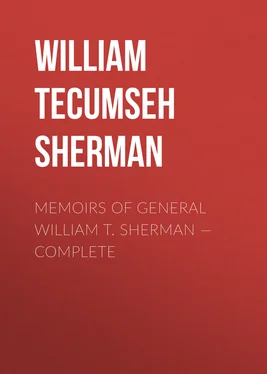William Tecumseh Sherman - Memoirs of General William T. Sherman — Complete
Здесь есть возможность читать онлайн «William Tecumseh Sherman - Memoirs of General William T. Sherman — Complete» — ознакомительный отрывок электронной книги совершенно бесплатно, а после прочтения отрывка купить полную версию. В некоторых случаях можно слушать аудио, скачать через торрент в формате fb2 и присутствует краткое содержание. Жанр: Биографии и Мемуары, История, foreign_edu, foreign_antique, foreign_prose, на английском языке. Описание произведения, (предисловие) а так же отзывы посетителей доступны на портале библиотеки ЛибКат.
- Название:Memoirs of General William T. Sherman — Complete
- Автор:
- Жанр:
- Год:неизвестен
- ISBN:нет данных
- Рейтинг книги:4 / 5. Голосов: 1
-
Избранное:Добавить в избранное
- Отзывы:
-
Ваша оценка:
- 80
- 1
- 2
- 3
- 4
- 5
Memoirs of General William T. Sherman — Complete: краткое содержание, описание и аннотация
Предлагаем к чтению аннотацию, описание, краткое содержание или предисловие (зависит от того, что написал сам автор книги «Memoirs of General William T. Sherman — Complete»). Если вы не нашли необходимую информацию о книге — напишите в комментариях, мы постараемся отыскать её.
Memoirs of General William T. Sherman — Complete — читать онлайн ознакомительный отрывок
Ниже представлен текст книги, разбитый по страницам. Система сохранения места последней прочитанной страницы, позволяет с удобством читать онлайн бесплатно книгу «Memoirs of General William T. Sherman — Complete», без необходимости каждый раз заново искать на чём Вы остановились. Поставьте закладку, и сможете в любой момент перейти на страницу, на которой закончили чтение.
Интервал:
Закладка:
One day, as I sat in our office, an Irishman came in and said he had a case and wanted a lawyer. I asked him to sit down and give me the points of his case, all the other members of the firm being out. Our client stated that he had rented a lot of an Irish landlord for five dollars a month; that he had erected thereon a small frame shanty, which was occupied by his family; that he had, paid his rent regularly up to a recent period, but to his house he had appended a shed which extended over a part of an adjoining vacant lot belonging to the same landlord, for which he was charged two and a half dollars a month, which he refused to pay. The consequence was, that his landlord had for a few months declined even his five dollars monthly rent until the arrears amounted to about seventeen dollars, for which he was sued. I told him we would undertake his case, of which I took notes, and a fee of five dollars in advance, and in due order I placed the notes in the hands of McCook, and thought no more of it.
A month or so after, our client rushed into the office and said his case had been called at Judge Gardner's (I think), and he wanted his lawyer right away. I sent him up to the Circuit Court, Judge Pettit's, for McCook, but he soon returned, saying he could not find McCook, and accordingly I hurried with him up to Judge Gardner's office, intending to ask a continuance, but I found our antagonist there, with his lawyer and witnesses, and Judge Gardner would not grant a continuance, so of necessity I had to act, hoping that at every minute McCook would come. But the trial proceeded regularly to its end; we were beaten, and judgment was entered against our client for the amount claimed, and costs. As soon as the matter was explained to McCook, he said "execution" could not be taken for ten days, and, as our client was poor, and had nothing on which the landlord could levy but his house, McCook advised him to get his neighbors together, to pick up the house, and carry it on to another vacant lot, belonging to a non-resident, so that even the house could not be taken in execution. Thus the grasping landlord, though successful in his judgment, failed in the execution, and our client was abundantly satisfied.
In due time I closed up my business at Leavenworth, and went to Lancaster, Ohio, where, in July, 1859, I received notice from Governor Wickliffe that I had been elected superintendent of the proposed college, and inviting me to come down to Louisiana as early as possible, because they were anxious to put the college into operation by the 1st of January following. For this honorable position I was indebted to Major D. C. Buell and General G. Mason Graham, to whom I have made full and due acknowledgment. During the civil war, it was reported and charged that I owed my position to the personal friendship of Generals Bragg and Beauregard, and that, in taking up arms against the South, I had been guilty of a breach of hospitality and friendship. I was not indebted to General Bragg, because he himself told me that he was not even aware that I was an applicant, and had favored the selection of Major Jenkins, another West Point graduate. General Beauregard had nothing whatever to do with the matter. .
CHAPTER VII.
LOUISIANA
In the autumn of 1859, having made arrangements for my family to remain in Lancaster, I proceeded, via Columbus, Cincinnati, and Louisville, to Baton Rouge, Louisiana, where I reported for duty to Governor Wickliffe, who, by virtue of his office, was the president of the Board of Supervisors of the new institution over which I was called to preside. He explained to me the act of the Legislature under which the institution was founded; told me that the building was situated near Alexandria, in the parish of Rapides, and was substantially finished; that the future management would rest with a Board of Supervisors, mostly citizens of Rapides Parish, where also resided the Governor-elect, T. O. Moore, who would soon succeed him in his office as Governor and president ex officio; and advised me to go at once to Alexandria, and put myself in communication with Moore and the supervisors. Accordingly I took a boat at Baton Rouge, for the mouth of Red River.
The river being low, and its navigation precarious, I there took the regular mail-coach, as the more certain conveyance, and continued on toward Alexandria. I found, as a fellow-passenger in the coach, Judge Henry Boyce, of the United States District Court, with whom I had made acquaintance years before, at St. Louis, and, as we neared Alexandria, he proposed that we should stop at Governor Moore's and spend the night. Moore's house and plantation were on Bayou Robert, about eight miles from Alexandria. We found him at home, with his wife and a married daughter, and spent the night there. He sent us forward to Alexandria the next morning, in his own carriage. On arriving at Alexandria, I put up at an inn, or boarding-house, and almost immediately thereafter went about ten miles farther up Bayou Rapides, to the plantation and house of General G. Mason Graham, to whom I looked as the principal man with whom I had to deal. He was a high-toned gentleman, and his whole heart was in the enterprise. He at once put me at ease. We acted together most cordially from that time forth, and it was at his house that all the details of the seminary were arranged. We first visited the college-building together. It was located on an old country place of four hundred acres of pineland, with numerous springs, and the building was very large and handsome. A carpenter, named James, resided there, and had the general charge of the property; but, as there was not a table, chair, black-board, or any thing on hand, necessary for a beginning, I concluded to quarter myself in one of the rooms of the seminary, and board with an old black woman who cooked for James, so that I might personally push forward the necessary preparations. There was an old rail-fence about the place, and a large pile of boards in front. I immediately engaged four carpenters, and set them at work to make out of these boards mess-tables, benches, black-boards, etc. I also opened a correspondence with the professors-elect, and with all parties of influence in the State, who were interested in our work: At the meeting of the Board of Supervisors, held at Alexandria, August 2, 1859, five professors had been elected: 1. W. T. Sherman, Superintendent, and Professor of Engineering, etc.; 2. Anthony Vallas, Professor of Mathematics, Philosophy, etc.; 3. Francis W. Smith, Professor of Chemistry, etc.; 4. David F. Boyd, Professor of Languages, English and Ancient; 5. E. Berti St. Ange, Professor of French and Modern Languages.
These constituted the Academic Board, while the general supervision remained in the Board of Supervisors, composed of the Governor of the State, the Superintendent of Public Education, and twelve members, nominated by the Governor, and confirmed by the Senate. The institution was bound to educate sixteen beneficiary students, free of any charge for tuition. These had only to pay for their clothing and books, while all others had to pay their entire expenses, including tuition.
Early in November, Profs. Smith, Yallas, St. Ange, and I, met a committee of the Board of Supervisors, composed of T. C. Manning, G. Mason Graham, and W. W. Whittington, at General Graham's house, and resolved to open the institution to pupils on the 1st day of January, 1860. We adopted a series of bylaws for the government of the institution, which was styled the "Louisiana Seminary of Learning and Military Academy." This title grew out of the original grant, by the Congress of the United States, of a certain township of public land, to be sold by the State, and dedicated to the use of a "seminary of learning." I do not suppose that Congress designed thereby to fix the name or title; but the subject had so long been debated in Louisiana that the name, though awkward, had become familiar. We appended to it "Military Academy," as explanatory of its general design.
Читать дальшеИнтервал:
Закладка:
Похожие книги на «Memoirs of General William T. Sherman — Complete»
Представляем Вашему вниманию похожие книги на «Memoirs of General William T. Sherman — Complete» списком для выбора. Мы отобрали схожую по названию и смыслу литературу в надежде предоставить читателям больше вариантов отыскать новые, интересные, ещё непрочитанные произведения.
Обсуждение, отзывы о книге «Memoirs of General William T. Sherman — Complete» и просто собственные мнения читателей. Оставьте ваши комментарии, напишите, что Вы думаете о произведении, его смысле или главных героях. Укажите что конкретно понравилось, а что нет, и почему Вы так считаете.












